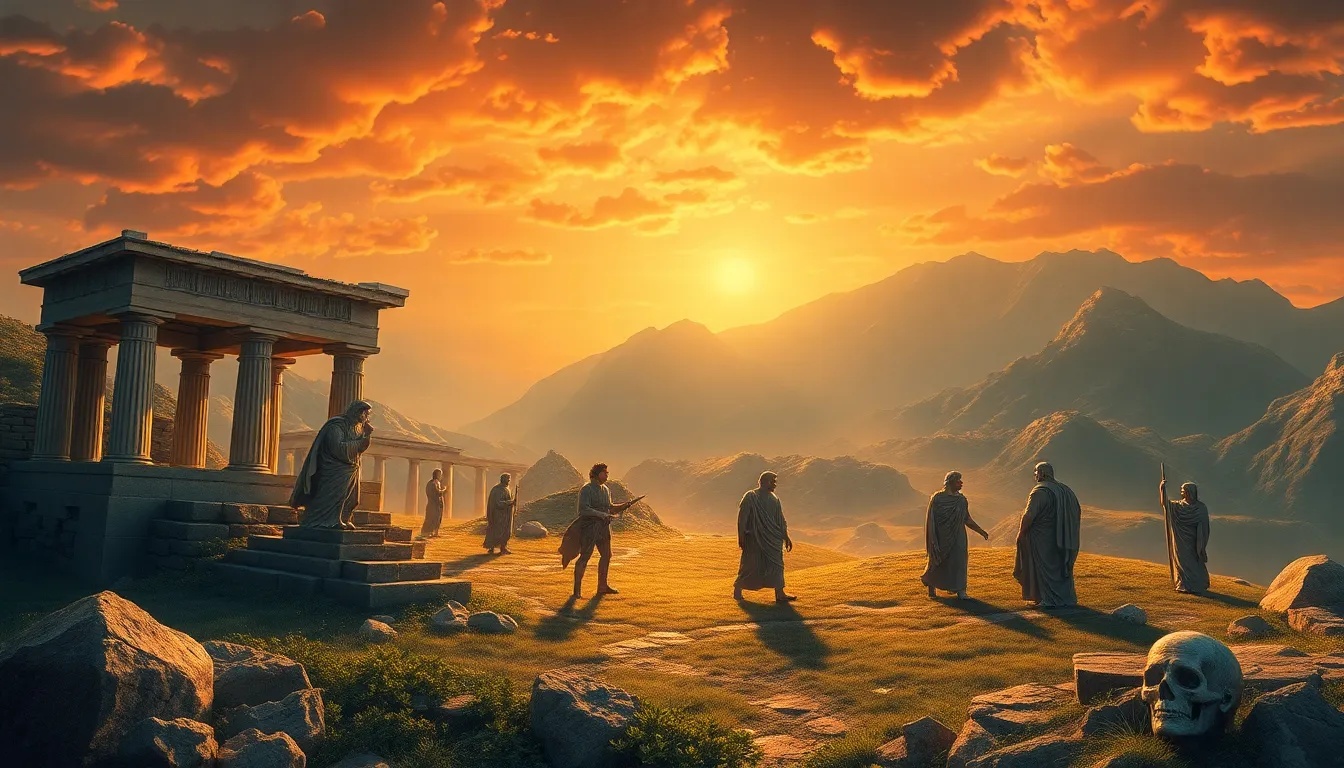The Influence of Greek Creation Myths on Western Literature
I. Introduction
Greek creation myths are foundational narratives that explain the origins of the world, humanity, and the gods. These myths are not just stories; they are the embodiment of ancient Greek beliefs, values, and cultural identity. From the chaotic beginnings of the universe to the emergence of ordered society under the reign of powerful deities, these myths have captivated audiences for centuries.
The significance of Greek creation myths in ancient Greek culture cannot be overstated. They served as guides for understanding existence, morality, and the natural world. This article aims to explore the profound impact of these myths on Western literature, tracing their influence from classical antiquity to contemporary storytelling.
II. Historical Context of Greek Creation Myths
The origins of Greek creation myths can be traced back to an oral tradition that predates written records. Variations of these myths exist, revealing a rich tapestry of beliefs that evolved over time. Key texts like Hesiod’s “Theogony” provide a systematic account of the genealogy of the gods and the creation of the cosmos, while Homer’s epics, such as the “Iliad” and the “Odyssey,” incorporate these myths into their narrative fabric.
Oral tradition played a crucial role in the transmission of these myths. Storytellers would pass down tales of creation, often adapting them to suit their audiences, which resulted in a dynamic and evolving mythological canon.
III. Common Themes in Greek Creation Myths
Several themes recur throughout Greek creation myths, highlighting the complexities of existence:
- Chaos and the emergence of order: Many myths begin with Chaos, a primordial void, from which order and structure arise through the actions of the gods.
- The role of gods and divine intervention: The gods are central figures, often intervening in human affairs and shaping the course of events.
- The interplay between fate and free will: Characters in these myths grapple with predestined outcomes while exercising their free will, leading to profound philosophical questions.
IV. Influence on Classical Literature
The influence of Greek creation myths extended into Roman literature, where they were adapted and reinterpreted. Authors like Virgil and Ovid drew heavily from Greek myths, embedding them within their own narratives and exploring similar themes of creation and transformation.
For instance:
- Virgil’s “Aeneid”: Incorporates Homeric themes and presents a mythological foundation for the origins of Rome.
- Ovid’s “Metamorphoses”: A sprawling narrative that reimagines Greek myths and highlights the fluidity of identity and existence.
The legacy of Greek creation myths continued into the Renaissance, where artists and writers rediscovered classical themes, leading to a revival of mythological narratives in literature and art.
V. Greek Creation Myths in Modern Literature
In contemporary literature, Greek creation myths have been reinterpreted and reimagined by numerous authors, offering fresh perspectives on timeless themes. Notable examples include:
- Jorge Luis Borges: Often weaves elements of Greek mythology into his narratives, exploring themes of infinity and existentialism.
- Margaret Atwood: Incorporates mythological elements in her works, such as “The Penelopiad,” which reexamines the story of Odysseus from Penelope’s perspective.
The symbolism of creation myths continues to resonate in modern storytelling, serving as a backdrop for exploring the human condition, identity, and our place in the universe.
VI. The Philosophical and Psychological Implications
Greek creation myths delve into profound philosophical and psychological questions regarding human existence and identity. They provide frameworks for exploring:
- The nature of existence: Myths prompt reflection on the origins and purpose of life.
- Identity: Characters often struggle with their roles and destinies, mirroring contemporary existential dilemmas.
- Moral and ethical narratives: The actions of gods and mortals often reflect moral lessons, shaping ethical discourse throughout history.
VII. Comparative Analysis with Other Cultural Myths
When examining Greek creation myths, it is essential to consider their similarities and differences with creation myths from other cultures, such as Mesopotamian, Egyptian, and Hindu traditions. Common themes include:
- Chaos and order: Many cultures begin their creation narratives in a state of chaos, leading to the emergence of order.
- Divine beings: The involvement of gods in creation is a universal motif.
- Humanity’s place in the cosmos: Myths often explore humanity’s relationship with the divine and the natural world.
The universality of these themes underscores the significance of cross-cultural influences in literary development, enriching the global literary landscape.
VIII. Conclusion
Greek creation myths have left an indelible mark on Western literature, influencing countless authors and shaping narratives across centuries. Their themes of chaos, divine intervention, and the struggle between fate and free will remain relevant today, providing insight into the human experience.
As we reflect on the relevance of these myths in contemporary society, it becomes clear that they offer valuable lessons about identity, morality, and our place in the universe. Ultimately, mythological narratives are crucial for understanding human culture and creativity, serving as a bridge between the past and the present.




